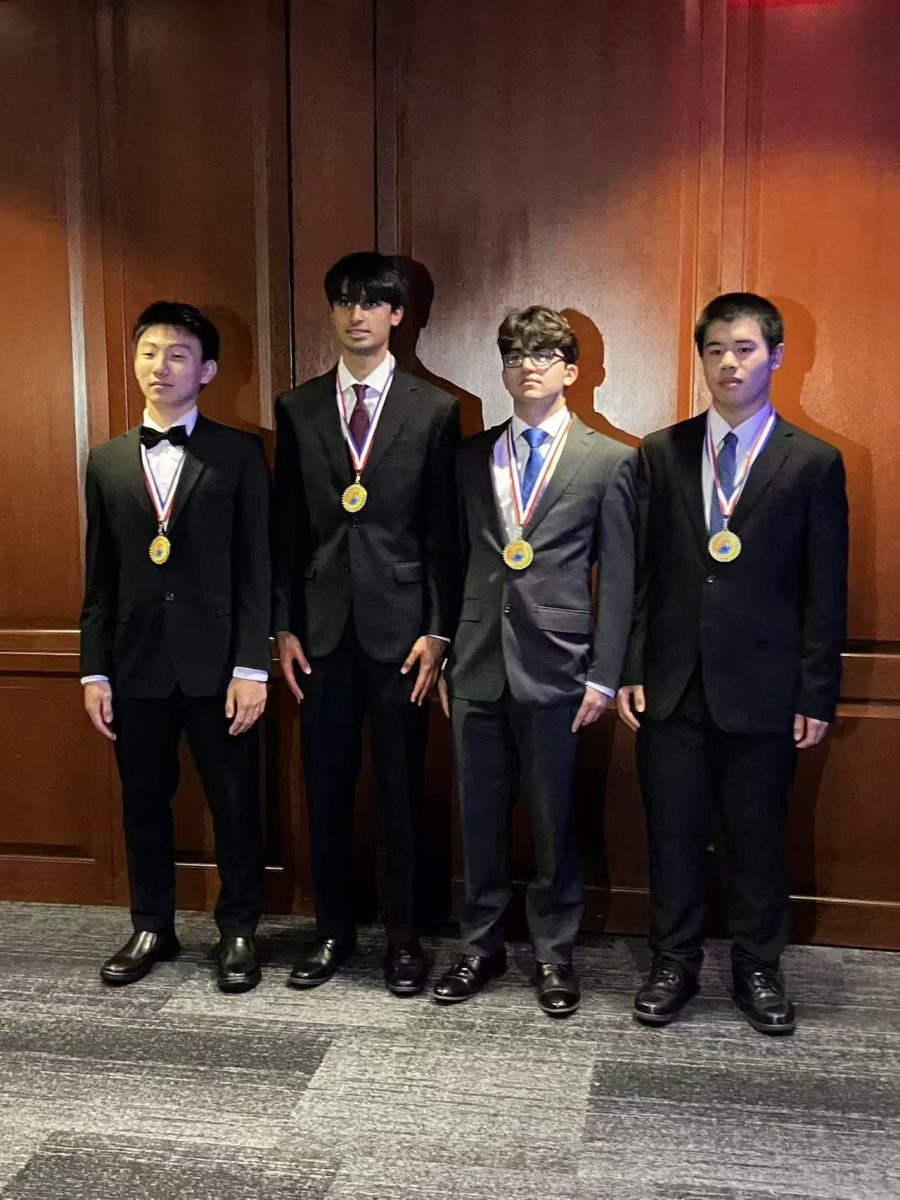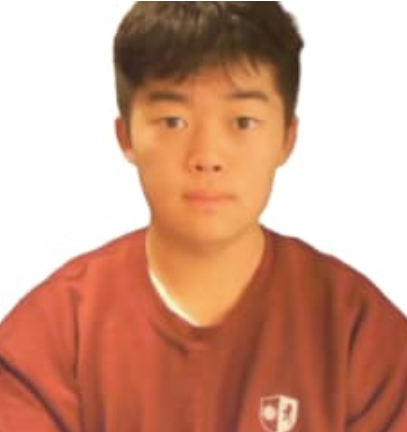“All that glitters may not be gold, but at least it contains free electrons,” wrote John Desmond Bernal, a famous molecular biologist and pioneer of X-ray crystallography. And while that may be true, the medal that William W. ’27 won at the 2025 International Chemistry Olympiad (IChO) in Dubai did contain free electrons, it did glitter, and it was, in fact, gold. William, alongside three of his teammates, Adam, Yash, and Max, all won gold medals as part of the team representing the United States.
Each year, more than 80 countries send their top four students, making it one of the most competitive academic contests in the world, on par with the International Math, Physics, and Informatics Olympiads; the International Science and Engineering Fair; and the Regeneron Science Talent Search. Around 300 students spend ten days at the international event, answering a battery of questions and completing a wide selection of lab tests and skills that often extend beyond the undergraduate curriculum. Past exams have featured topics ranging from nanomaterials and spectroscopy to environmental chemistry and its cutting-edge industrial applications. Since joining the competition in 1984, the United States has consistently ranked among the strongest teams, with all four representatives frequently returning home with gold medals.
Prospective representatives had to go through three rounds of selection — local, national, and camp. Students had to compete in the 60-question, 110-minute Local Chemistry Olympiad administered by the American Chemical Society. Taking place in March of every year, the top scorers, typically those who score above a 50, compete in a 285-minute national exam consisting of multiple-choice, free-response, and laboratory problems. Of the 1,000 students this National Chemistry Olympiad is administered to, the top 20 scorers — just 2% — are selected for a two-week intensive study camp where students are rigorously trained and evaluated through laboratory and theoretical exams. Vishnu M. ’26 and William both attended the camp. Based on the performance of the twenty students during the camp, the top four students were selected to represent the United States at the Olympiad.
After being selected for the US team, chemistry “took up pretty much all of the time [William] spent awake, other than eating meals.” Before heading to Dubai, William and his teammates “were speeding through different topics in biochemistry…discussing countless pathways, metabolites, and lab procedures.” Daily team calls dissecting past practical exams were “an amazing resource and motivator” for him, even though the tests themselves were individual. In addition to support from his coaches and fellow “campers” and teammates, William noted that “[p]articipating in competitions like science bowl and science olympiad definitely pushed me to work harder in preparing for [the] chemistry olympiad. I would also like to thank Ms. Wallace and Dr. Russell for graciously supporting me in my preparation last year, especially because I got to spend more time in the lab during and outside of class.”
But even with that level of preparation, he notes that the Olympiad is only one narrow measure of what it means to do chemistry: “Being a strong chemist surely does not mean being capable of performing on five-hour examinations, which are basically standardized.” What matters, he added, is the years of work and reasoning that let someone contribute to the field itself. Preparing for the Olympiad can sharpen those habits, but he sees the competition as only a narrow slice of chemistry. “IChO orients you to treat chemistry as a test instead of a science,” he reflected, “though that could not be further from the truth — and reorienting myself is kind of where I am now.”
The IChO is a two-part examination consisting of a practical and a theoretical phase. In the practical phase, Olympians are evaluated on laboratory tasks and skills, including synthesis and identification of compounds, measurements and procedures, and evaluations of results. The practical phase lasts up to five hours. During the theoretical phase that follows two days after, students are tested on advanced topics in chemistry, including physical, descriptive, organic, and inorganic chemistry, along with questions on bonding and structure.
In addition to solving these batteries of tests and questions across two different days, William spent an additional nine days in the UAE, visiting parts of Abu Dhabi and Dubai, writing that his most memorable moment was meeting other teams at a bookstore in the Dubai mall, where “we [the teams] laughed about inside jokes and created new ones with the titles that surrounded us.” Unfortunately for William, he didn’t exactly have the most exciting start to the competition, writing to Tatler that he “spent basically the entire day half asleep, waiting in the hospital,” with a suspicious rash and an IV in his hand.
Despite the minor setback, William joins a school tradition of scientific excellence that stretches back nearly a century. In 1929, Wilber B. Huston ’29 brought Lakeside fame after being named “America’s Brightest Boy” by winning Thomas Edison’s nationwide scholarship contest, judged by Edison, Henry Ford, Charles Lindbergh, and the leadership of MIT and Phillips Exeter. Huston went on to attend MIT and become a NASA mission director. Three decades later, John Drumheller ’60 earned recognition in the Westinghouse Science Talent Search (now Regeneron STS) for his invention of the “DRING,” a digital relay calculator, and for his top marks on a comprehensive science exam. In 2019, Sanjay Raman ’19 won a silver medal at the International Physics Olympiad, and two years ago, Alex Zhao ’24 claimed gold at the International Mathematical Olympiad.
More recently, Lakeside’s Science Olympiad team placed at the National Tournament, Aanika Tangirala ’25 won the Fourth Award at the International Science and Engineering Fair, and Vishnu M. ’26 earned three gold medals at the International Earth Science Olympiad. Alongside recent top-four recognition in the National Science Bowl, which consisted of William, Vishnu, Emma L. ’27, Rohan Dhillon ’25, and Daniel Wang ’25, these achievements highlight a sustained legacy of Lakesiders’ success in regional and national competitions.
As for what’s next? William writes that “taking pleasure in learning about chemistry and discovering what I am really passionate about is the sort of direction I am taking and that I want to take. I wouldn’t go so far as to say that these are ‘goals,’ since these ideas and certitudes about my future will take time to fully coalesce. After spending so much time learning chemistry and, essentially, grinding for the olympiad, which is quite well-defined and finite, I think that it is warranted to slow down a little rather than having things figured out.”


